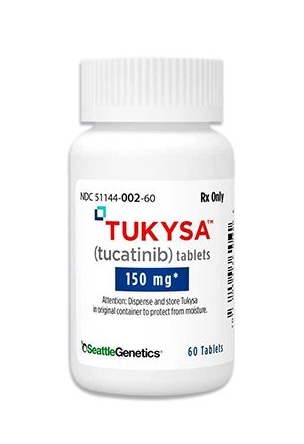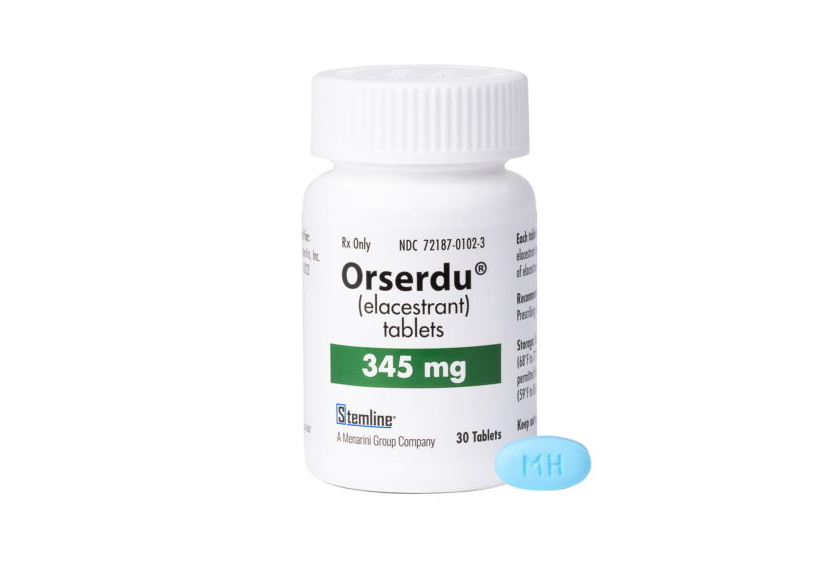Tukysa (tucatinib) vs Orserdu (elacestrant)
Tukysa (tucatinib) vs Orserdu (elacestrant)
Tukysa (tucatinib) and Orserdu (elacestrant) are targeted therapies used in the treatment of certain types of breast cancer, but they work in different ways and are used for different subtypes of the disease. Tukysa is a tyrosine kinase inhibitor that specifically targets HER2-positive breast cancer, often used in combination with other drugs like trastuzumab and capecitabine. In contrast, Orserdu is a selective estrogen receptor degrader (SERD) indicated for the treatment of estrogen receptor (ER)-positive, HER2-negative advanced or metastatic breast cancer, particularly in patients who have received prior endocrine therapy. Patients should consult with their healthcare provider to determine which medication is most appropriate for their specific cancer subtype and treatment history.
Difference between Tukysa and Orserdu
| Metric | Tukysa (tucatinib) | Orserdu (elacestrant) |
|---|---|---|
| Generic name | Tucatinib | Elacestrant |
| Indications | HER2-positive breast cancer | ER+/HER2- advanced or metastatic breast cancer |
| Mechanism of action | Tyrosine kinase inhibitor | Estrogen receptor antagonist |
| Brand names | Tukysa | Orserdu |
| Administrative route | Oral | Oral |
| Side effects | Diarrhea, palmar-plantar erythrodysesthesia, nausea, fatigue, hepatotoxicity, vomiting, stomatitis, decreased appetite, anemia, rash, and others | Nausea, vomiting, fatigue, decreased appetite, constipation, and others |
| Contraindications | None known | None known |
| Drug class | Tyrosine kinase inhibitor | Selective estrogen receptor degrader (SERD) |
| Manufacturer | Seagen Inc. | Radiant Pharmaceuticals |
Efficacy
Tukysa (tucatinib) Efficacy in Breast Cancer
Tukysa (tucatinib) is a medication that has shown efficacy in treating HER2-positive breast cancer, which is a type of breast cancer characterized by an overexpression of the human epidermal growth factor receptor 2 (HER2). Tucatinib is a tyrosine kinase inhibitor that specifically targets HER2. The pivotal trial that led to the approval of Tukysa was the HER2CLIMB study, which demonstrated significant improvement in progression-free survival (PFS) and overall survival (OS) when tucatinib was added to trastuzumab and capecitabine in patients with previously treated HER2-positive metastatic breast cancer. Patients who received tucatinib experienced a 46% reduction in the risk of disease progression or death compared to those who received placebo.
Additionally, Tukysa has shown efficacy in patients with brain metastases, a group often excluded from clinical trials. In the HER2CLIMB study, tucatinib in combination with trastuzumab and capecitabine significantly reduced the risk of disease progression or death in patients with brain metastases. This finding is particularly important as HER2-positive breast cancer patients have a higher risk of developing brain metastases, and treatment options for this population have historically been limited.
Orserdu (elacestrant) Efficacy in Breast Cancer
Orserdu (elacestrant) is an investigational oral selective estrogen receptor degrader (SERD) that has shown promise in the treatment of estrogen receptor-positive (ER+), HER2-negative advanced or metastatic breast cancer. In clinical trials, Orserdu has demonstrated efficacy in patients with ER+ breast cancer who have received prior endocrine therapy. The most notable study, the EMERALD Phase 3 trial, showed that Orserdu significantly improved PFS compared to standard endocrine therapies (such as fulvestrant or an aromatase inhibitor) in patients with ER+, HER2- advanced breast cancer who had disease progression on prior endocrine therapy.
Orserdu's efficacy was also observed in patients with ESR1 mutations, which are associated with resistance to endocrine therapy. In the EMERALD trial, patients with ESR1 mutations treated with Orserdu showed a greater improvement in PFS compared to those treated with standard endocrine therapies. This suggests that Orserdu may provide a new treatment option for patients with endocrine-resistant ER+ breast cancer, addressing a significant unmet need in this patient population.
Regulatory Agency Approvals
Tukysa
-
European Medical Agency (EMA), European Union

-
Food and Drug Administration (FDA), USA

-
Health Canada

-
Therapeutic Goods Administration (TGA), Australia

-
Swissmedic (CH)

Orserdu
-
Food and Drug Administration (FDA), USA

Access Tukysa or Orserdu today
If Tukysa or Orserdu are not approved or available in your country (e.g. due to supply issues), you can access them via Everyone.org.
How it works

Make an enquiry
Choose the medicine you want to buy, answer a couple of questions, and upload your prescription to speed things up. We’ll get back to you within 24 hours.


Make an enquiry
Choose the medicine you want to buy, answer a couple of questions, and upload your prescription to speed things up. We’ll get back to you within 24 hours.


Breeze through the paperwork
We'll guide you through the required documents for importing unapproved medicine, ensuring you have all the necessary information.


Get a personalized quote
We’ll prepare a quote for you, including medicine costs and any shipping, administrative, or import fees that may apply.


Receive your medicine
Accept the quote and we’ll handle the rest - sourcing and safely delivering your medicine.

Some text on this page has been automatically generated. Speak to your physician before you start a new treatment or medication.
Let's talk
If you have any questions, call us or send us a message through WhatsApp or email:
Contact us




